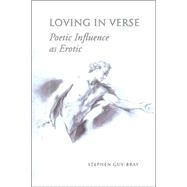Loving in Verse
, by Guy-Bray, Stephen- ISBN: 9780802092038 | 0802092039
- Cover: Hardcover
- Copyright: 12/13/2006
The current critical tendency in the study of Renaissance literature is to regard the relationship between a poet and his predecessor as either familial or antagonistic. Stephen Guy-Bray argues that neither of these models can be applied to all poetic relationships and that, in fact, the romantic and even sexual nature of some relationships must be considered.Loving in Verse examines how three poets present their relationship to their most important predecessors, beginning with Dante's use of Virgil and Statius in the Divine Comedy , moving on to Spenser's use of medieval English poets in the Faerie Queene , and finally addressing Hart Crane's use of Whitman in The Bridge . In each case, Guy-Bray shows how the younger poet presents himself and the older poet as part of a male couple. He goes on to demonstrate how male couples are, in fact, found throughout these poems, and while some are indeed familial or hostile, many are romantic or sexual. Using concepts from queer theory and close readings of images and allusions in these texts, Loving in Verse demonstrates the importance of homoeroticism to an examination of poetic influence. A discussion of the theories of poetic influence from four twentieth-century writers (T.S. Eliot, Harold Bloom, Roland Barthes, and Frank O'Hara) concludes Guy-Bray's analysis.






